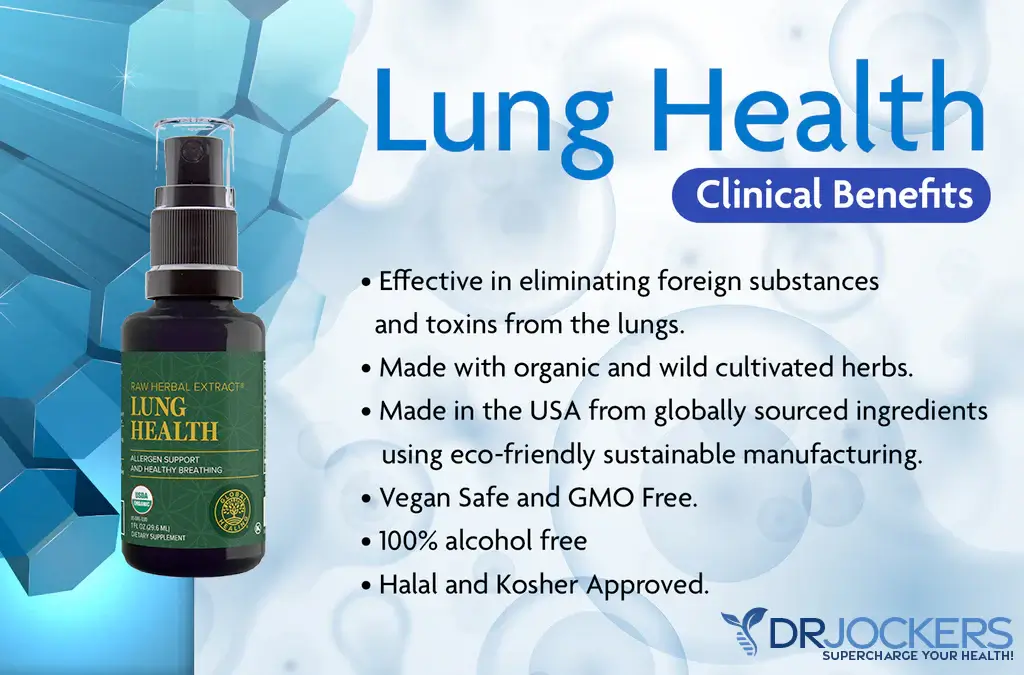Strep Throat: Symptoms and 15 Natural Support Strategies
Strep throat is a bacterial infection that causes an infection of the throat and tonsils, sore and red throat with white patches, difficulty swallowing, and other symptoms. Though it can affect anyone, it is the most common among children between the ages of 5 to 15. Though strep throat can be uncomfortable, there are a number of natural support strategies you can use to ease symptoms and enhance recovery.
In this article, you will learn what strep throat is. You will understand the signs and symptoms of strep throat. I will discuss the risk factors for strep throat. You will learn about diagnosis and conventional treatment strategies. Finally, I will offer my best natural support strategies to improve your health.

What is Strep Throat
Strep throat is not an ordinary throat infection. Most sore throats are caused by viruses. Strep through, however, is caused by a bacterium called group A Streptococcus or group A strep. Strep throat generally causes infection of the throat and the tonsils, inflammation, and pain.
Though strep throat can affect people of all ages, it is most common between ages 5 and 15. Strep throat is an airborne infection. It is spread through small respiratory droplets from sneezes and coughs, sharing food utensils or glass, touching something with infected droplets, and direct contact with another person with strep throat.
It is highly contagious, so it often spreads at daycares, schools, and other places where people, especially children, congregate. It takes about 2 to 5 days to develop symptoms after exposure (1).

Signs & Symptoms of Strep Throat
Sore throat is the most common sign of strep throat. However, there are other signs.
Common signs of symptoms of strep throat may include:
- Sore throat that’s red with white patches.
- Difficulty swallowing
- Sudden fever
- Chills
- Swollen lymph nodes of the back
- Headache
- Loss of appetite
The severity of strep throat depends on the person. Some people only experience milder symptoms, such as a sore throat. Others develop fever and other symptoms.
In addition to these common symptoms, some less common signs and symptoms of strep throat may include:
- Nausea
- Stomach pain
- Vomiting
- Other gastrointestinal symptoms
- Scarlet fever or scarlatina, which is a very rare symptom causes a skin rash
Risk Factors for Strep Throat
There are a variety of risk factors for strep throat (2):
- Being between 5 and 15
- Attending daycare or a school, or other places where children are crowded.
- Being a parent of a child between ages 5 and 15
- Working with or being regularly in close contact with children between ages 5 and 15
- Living or working at a military training center or other places with crowds
- Poor hygiene
- Late winter and early spring: strep throat is a year-around infection; however, there are seasonal variations, with late winter and early spring being the highest risk times of the year (3)

Diagnosis & Conventional Treatment
First, your doctor will go over your symptoms. If you have a sore throat and other symptoms of strep throat, your doctor will examine your throat to check for inflammation and signs of strep, feel your lymph nodes for swelling, and ask about other symptoms.
If there is a clear indication of a viral infection, such as congestion, a runny nose, or a cough, your doctor can usually rule out strep throat without a test. If your doctors think that you have strep throat, they may do a rapid test at the office. Rapid tests are done with a long cotton swab, collecting a sample from your throat. Results are ready within 5 minutes.
Rapid tests are not completely reliable. False negatives are possible, so your doctor may collect a throat culture for further testing at an outside lab. This may be important if you are at higher risk for complications from an untreated infection. Rheumatic fever is one of the potential complications for children. Adults are at low risk for rheumatic fever, so throat cultures are usually not necessary. Throat culture results usually take a few days.
Strep throat is usually treated with antibiotics. The choice of antibiotics usually depends on your location and whether your geographic area has developed resistance to specific antibiotics. Antibiotics may help to fight the infection, shorten the length of being ill, decrease symptoms, prevent the spread of the infection, and reduce the risk of complications. If you’ve been prescribed antibiotics, it’s important that you complete the entire dose to ensure full recovery and to reduce the risk of reinfection (1).
However, frequent use of antibiotics can lead to antibiotic resistance. Antibiotics also clean out good bacteria along with the illness-causing bad bugs. This can lead to gut microbiome imbalance and chronic issues down the road. It’s important that you consider this and evaluate whether you really need to take them.
If you do take antibiotics, make sure to take a high-quality probiotic supplement, eat probiotic-rich fermented foods, and follow an anti-inflammatory, gut-friendly diet to protect your gut and avoid gut microbiome imbalances.
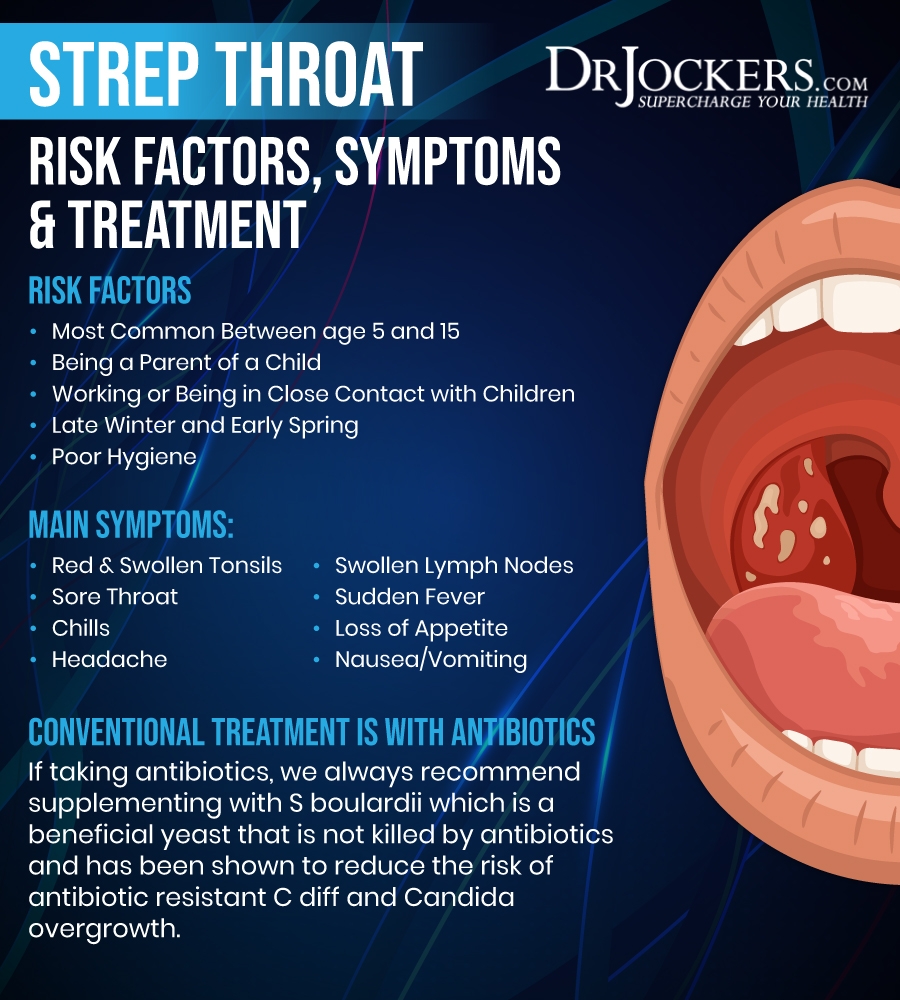
Natural Support Strategies
If you have strep throat, there are a number of natural support strategies that you can try. Here is what I recommend to support your health and ease your symptoms naturally:
Consume Immune Supportive Foods
If you are dealing with strep throat or any upper-respiratory infection, eating plenty of immune-supporting foods is critical for your recovery. Generally speaking, I recommend eating light, focusing on liquid nutrition, including bone broth, immune-supporting greens, vegetables, and fruits, anti-inflammatory, and immune-supportive herbs and spices. A few specific immune-supporting foods I recommend and have written about in this article include:
Lemon and lime are rich in vitamin C and are great for your immune health. You can add lemon or lime juice to your water, tea, smoothies, and green juices, and squeeze it into your salads or meals. A 2021 review published in Frontiers in Immunology has found that citrus fruits may help to reduce inflammation and boost immune health (4). You can learn more about the benefits of lemon and lime from this article.
Bone broth is a delicious and nutritious liquid made from brewed bones and connective tissues of cow, chicken, or even fish. It is incredibly rich in minerals and vitamins that may boost your immune health. Some of the benefits of bone broth come from bone marrow, which helps provide the raw materials for healthy blood cells and immune development.
According to a 2021 study published in Medicina (Kaunas), bone broth may offer anti-inflammatory benefits (5). It may also be soothing for a sore throat. To learn more about the benefits of bone broth, read this article.
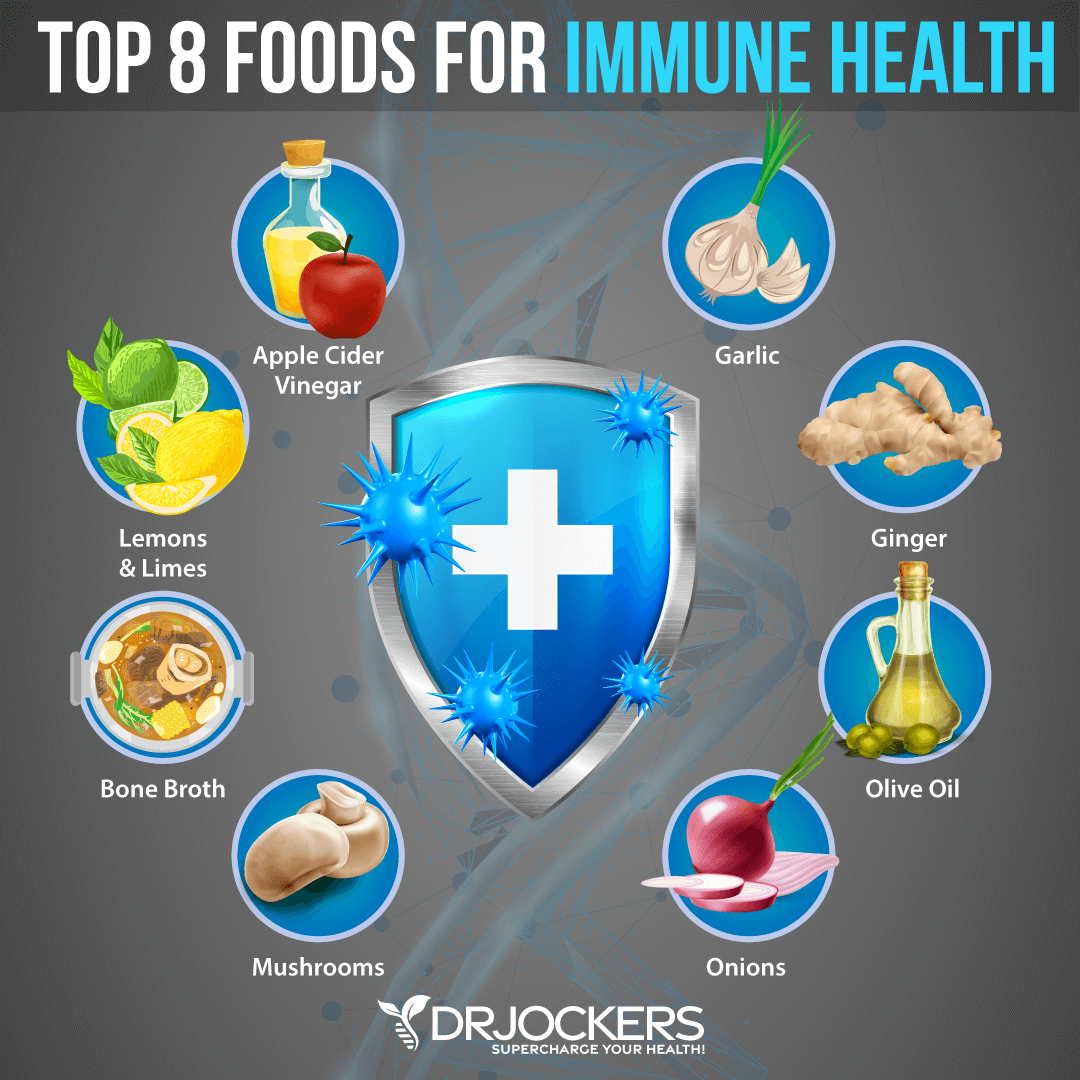
Mushrooms, including chaga, reishi, cordyceps, and even portabella mushrooms, are full of antioxidants and immune-boosting benefits. According to a 2014 review published in Integrative Medicine (Encinitas), mushrooms may have immune-modulatory effects (6).
Just add them to your morning smoothies, a cup of coffee, or stir-fry. I highly recommend my Paleo Stuffed Mushrooms recipe. You may learn about the benefits of chaga and reishi mushrooms here.
Garlic and onion are known for their immune-supporting and anti-inflammatory properties. According to a 2021 review published in Pharmaceutical Biology, onions offer antioxidant, immune-supporting, and anti-inflammatory benefits (7).
A 2012 study published in the African Journal of Traditional, Complementary, and Alternative Medicine has found that garlic may have immune-supporting benefits (8). You may learn more about the benefits of onions here and the benefits of garlic here.
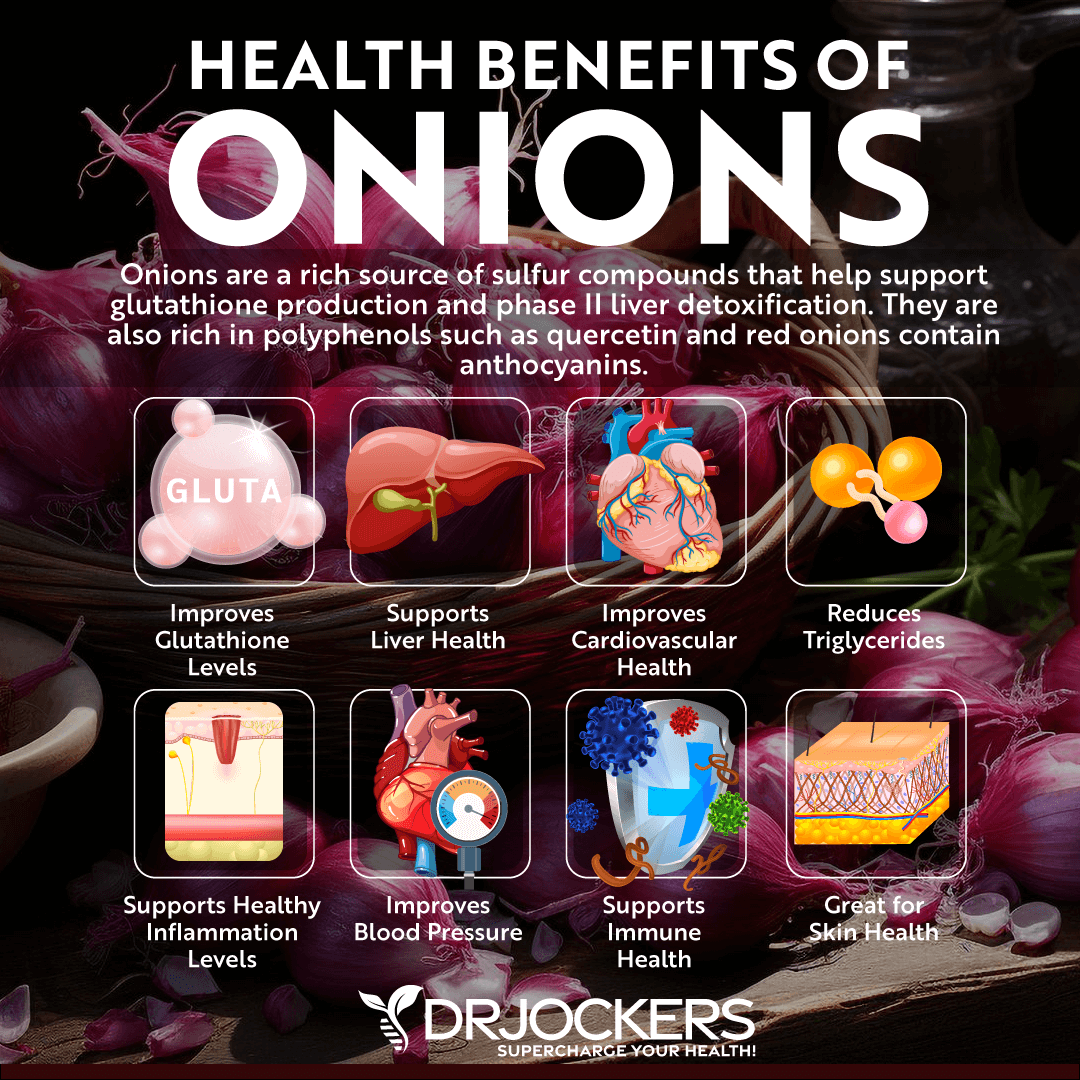
Olive oil is rich in antioxidants and full of anti-inflammatory and immune-supporting benefits. According to a 2010 study published in Nutricion Hospitalaria, olive oil may support the immune system and may be helpful for infections (9). I recommend that you choose extra-virgin olive oil.
Olive oil is fantastic when consumed raw. It provides a fantastic aroma and flavor to any salad dressing or dipping sauce. It is perfect for making stir-fries or baking vegetables as well. The very best olive oil is freshly pressed for the highest polyphenol counts, and you can get a $39 bottle of what my family and I use for just $1 here. You may learn more about the benefits of olive oil here.
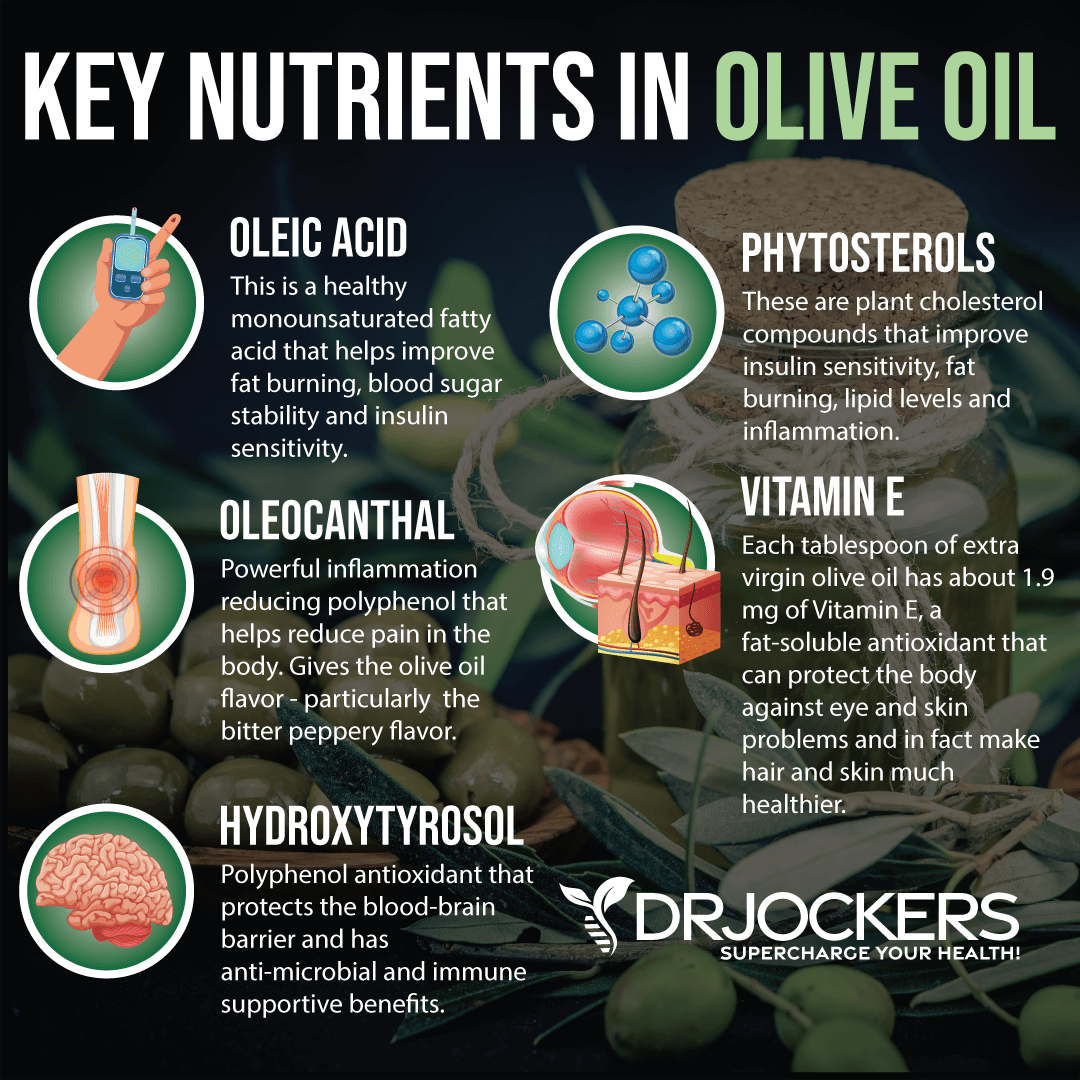
Apple cider vinegar is a type of vinegar that is created from the fermented, unstrained juice of crushed apples. It is high in proteolytic enzymes and acetic acid, which are postbiotics that improve the microbiome and help to get rid of bad bacteria and other pathogenic microbes.
According to 2017 research published in Fish & Shellfish Immunology, apple cider vinegar may have immunomodulatory benefits (10). I recommend adding apple cider vinegar to your water in the morning for extra immune health benefits. You may learn more about how to use apple cider vinegar here.
Ginger is another immune-boosting, anti-inflammatory herb. According to a 2013 review published in the International Journal of Preventive Medicine, ginger may offer anti-inflammatory and antioxidant benefits (11). Flavor any of your soups, dishes, and salads with a bit of ginger. Add it to your green juices and smoothies.
Make ginger tea for further immune health boost by boiling 2 tablespoons of ginger root in 1.5–2 cups of water for 10–15 minutes. Add a tablespoon of lemon juice for further immune health support. You may also try my Keto Thai Ginger Chicken recipe.
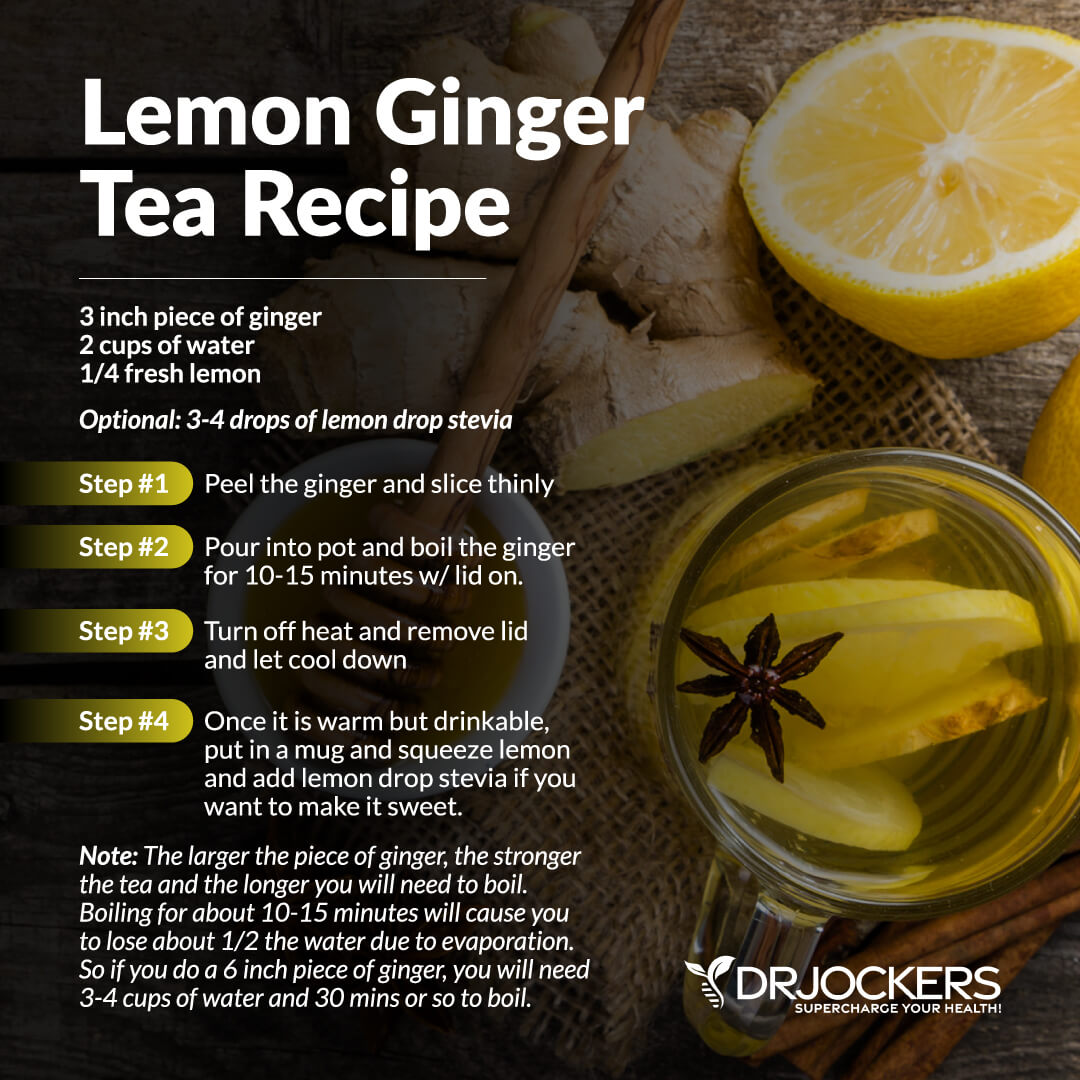
Gargle with Salt Water
One of the best things you can try for strep throat is gargling with warm salt water. A 2005 study published in the American Journal of Preventative Medicine found that gargling may be helpful for upper-respiratory infections (12). Gargling with salt water may help to reduce inflammation, swelling, and pain. I recommend mixing one teaspoon of sea salt with 8 ounces of warm water.
You can also add 1 teaspoon of hydrogen peroxide for bonus benefits. According to a 2021 study published in Evidence Based Complementary, and Alternative Medicine, hydrogen peroxide may be helpful for upper-respiratory conditions (13).
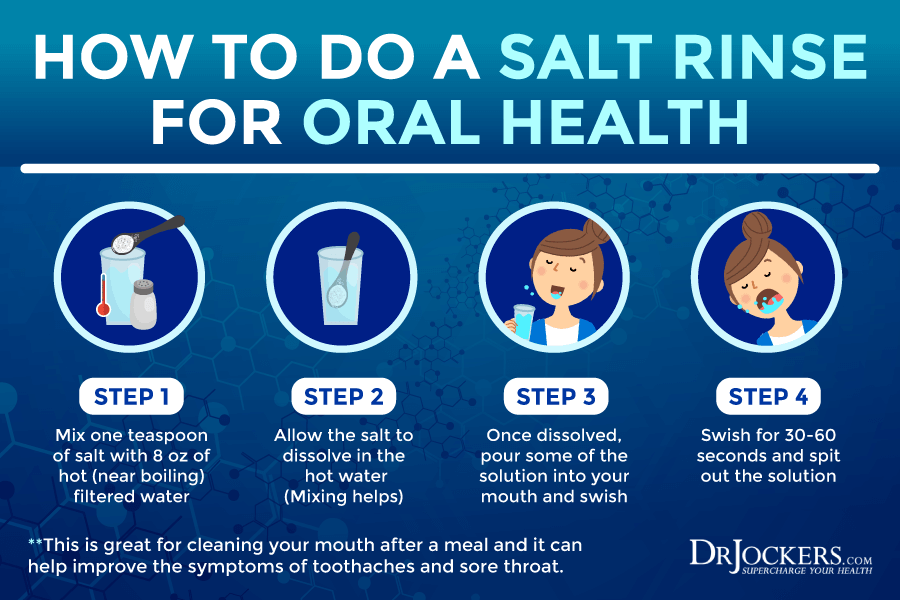
Gargle with Diluted Apple Cider Vinegar
Gargling with diluted apple cider vinegar is another option. As I discussed earlier, apple cider vinegar is high in vitamin C, vitamin E, and antioxidants and has probiotic benefits.
2017 research published in Fish & Shellfish Immunology has found that apple cider vinegar may have immunomodulatory benefits (10). Gargling with apple cider vinegar can help fight bacterial infections while soothing your symptoms.

Nebulize Hydrogen Peroxide
A nebulizer is a piece of medical equipment that changes certain medications or therapeutic supplements from a liquid form to a mist that allows you to inhale it into your lungs. Nebulizing helps to quickly administer the medication or supplement directly into your lungs.
Nebulizers have a mouthpiece or face mask to put over your face to inhale the mist through it. The therapeutic agent then goes straight into your respiratory system and lungs, exactly where you need it to take effect. Nebulizers are often recommended for people with asthma, various respiratory issues, and acute respiratory infections. Nebulizing with hydrogen peroxide may help to ease your respiratory symptoms.
Hydrogen peroxide (H2O2) is a mild antiseptic agent. Hydrogen peroxide releases oxygen when applied to affected areas, which causes foaming. This helps to destroy bacteria, clean areas, and remove dead skin cells. Hidden Epidemic, a book by Dr. Thomas Levy published by MedFox Publishing in 2017, discusses the role of hydrogen peroxide in acute viral respiratory infections (14).
A scientific article published by the Institute for Pure and Applied Knowledge (IPAK), Public Health Policy Initiative (PHPI) has also recommended nebulizing with hydrogen peroxide (15). You may learn more about nebulizing with hydrogen peroxide from this article.

Oil Pulling
You may also try oil pulling regularly. Oil pulling helps to reduce bad microbes, inflammation, and the risk of infections and helps to ‘pull’ out toxins from your oral cavity. It is generally recommended to practice oil pulling every morning before brushing your teeth. However, if you have strep throat, I recommend that you practice oil pulling every 2 to 3 hours.
Squish a tablespoon of coconut oil in your mouth for about 20 minutes. You may also add 1 drop of oregano oil or peppermint oil for antimicrobial benefits. This is a fantastic time for meditation, reflection, journaling, or grounding. Spit it out and brush your teeth carefully. I recommend using a different toothbrush after oil pulling than at other times of the day, as you are brushing away toxins.
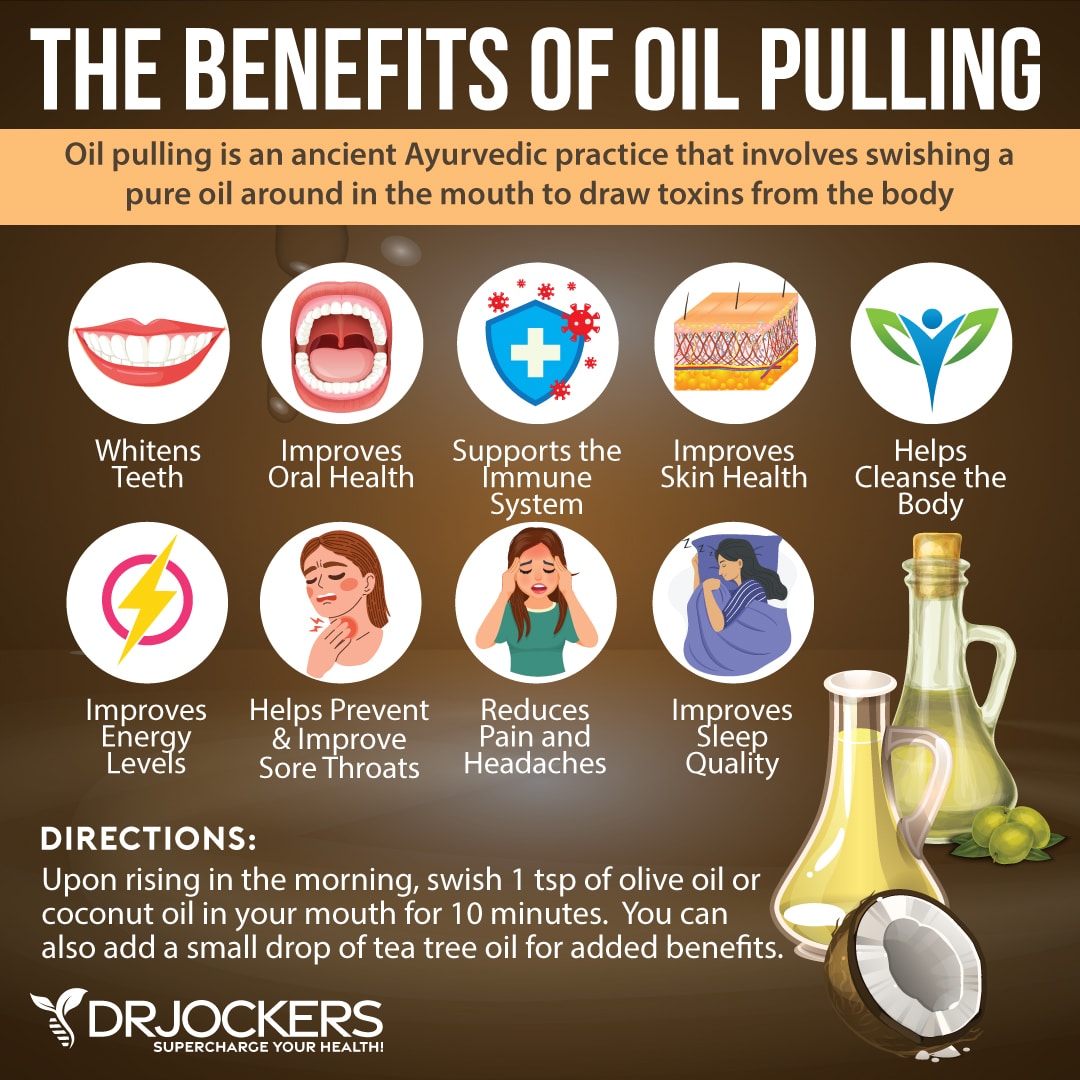
Replace Toothbrush and Scrape Your Tongue
I recommend replacing your toothbrush when you first get symptoms. Microbes can sit on your toothbrush.
This helps to reduce the bacterial load from the first few days of your infection, when the bacterial load is the highest. Once you recover, I recommend replacing your toothbrush again. This may help to avoid reinfecting yourself with strep throat.
Another thing to consider is tongue scraping. I recommend getting a good surgical-grade stainless steel tongue scraper. To scrape your tongue, follow these steps:
- Open your mouth and stick your tongue out in front of the mirror.
- Place the rounded end of the tongue scraper at the back of your tongue. If you feel like gagging, you may start around the middle and gradually move farther each time.
- Slowly and gently move the tongue scraper forward until the tip of your tongue.
- Remove any debris after each scrape with water or a washcloth.
- Repeat until you feel like you cleaned the entire surface of your tongue. Two scrapes are usually enough; however, you may find that you need more.
- Wash your tongue scraper carefully with warm water and soap. Dry and store it in a dry area until the next morning.

Use Colloidal or Nano Silver
Silver has been used for its antimicrobial and other health benefits in folk medicine for centuries to treat wounds, colds, and infections. Unlike ionic silver and silver protein solutions, true colloidal silver doesn’t contain any protein or other additives. Instead, it is made out of nanometre-sized silver particles, creating a highly effective form of silver.
Colloidal silver is made by mechanically grinding metallic silver into tiny silver particles or by converting silver salts into small silver crystals using an electrochemical reaction. Nanoparticle silver, or nano silver, is the most advanced form of silver you can use. It is made by using nanotechnology.
One of the ways nanotechnology is making a big impact on healthcare is by making nanoparticle silver, or nano-silver. Nanoparticles are incredibly tiny, allowing nano silver to be high-quality, pure, and toxin-free. When it comes to silver, even 0.01% impurity can cause harm to the body. Using nanotechnology helps to control the purity of nanoparticle silver (16).
According to a 2013 study published in the Journal of Alternative and Complementary Medicine, colloidal silver may have antibacterial properties. Using colloidal silver may help fight bacterial strep infections and support recovery (17). I recommend and personally use Silver Spray™, which is nano silver, the most advanced form of silver you can find.
It is a highly effective antimicrobial preparation composed of pure silver complexed with purified water made with Silver Sol Technology®. I recommend using it every 2 hours when you are awake. You may learn more about the benefits of colloidal and nano silver from this article.

Drink Warm Lemon Water
Lemon is incredibly rich in vitamin C. It offers antioxidant and immune-protecting benefits. A 2021 review published in Frontiers in Immunology has found that citrus fruits may help to reduce inflammation and boost immune health (4).
Drinking warm lemon water can support your immune system, hydrate your body, and soothe your sore throat. If you are experiencing rare symptoms of gastrointestinal discomfort, drinking warm lemon water may also support healthy digestion.

Get Some Movement and Healthy Sun Exposure
Getting some movement and healthy sun exposure is also important for your recovery. Movement helps to boost your immune system, and sunshine helps to improve your vitamin D levels, which is also important for your immune health. A 2021 study published in Clinical and Experimental Medicine has found that moving your body may support the immune system and may be beneficial against respiratory infections (18).
According to a 2011 review published in the Journal of Investigative Medicine, vitamin D is critical for your immune system health (19). According to a 2020 study published in the ACS Infectious Diseases, vitamin D may be effective against strep infections (20).
Of course, I don’t recommend doing a hard workout when you are sick. Doing some light stretching or going for a short, easy walk is more appropriate.
If you are feeling unwell, just sitting outside and doing some light stretching while sitting can be helpful too. Listen to your body, and don’t push it. But try to stand up and stretch out regularly, instead of just lying down all day. Increase your activity slowly as you are feeling better.

Optimize Sleep
Sleeping enough is incredibly important every day. It’s particularly important if you are not feeling well. Sleep helps to rejuvenate your cells and restore your health. According to a 2011 review published in Pflugers Archives, sleep is essential for normal immune function (21).
On a regular day, I recommend getting 7 to 9 hours of sleep a night. If you are not feeling well, you may need more. Honor your body with enough deep restorative sleep. Avoid sugar, alcohol, heavy foods, and stress that can interfere with your sleep.
Avoid electronics at least 2 to 3 hours before bedtime. Choose relaxing activities in the evening that will help you wind down, such as listening to music, reading, doing crossword puzzles, journaling, and meditation. Make sure you have a comfortable bed, mattress, bedding, and pillows, and use blackout curtains and an eyemask for better sleep.

Use an Infrared Sauna
Infrared sauna therapy is fantastic for detoxification and immune function. It is a form of sauna that uses infrared heaters that release infrared light you experience as heat, as it gets absorbed through the surface of the skin.
Through this process, infrared sauna therapy heats your muscle tissues and internal organs without heating the surrounding air. This heat helps your organs and tissues to detoxify and pushes tissues to your bloodstream to be eliminated by perspiration or sweating.
The infrared wavelengths may help to enhance liver detoxification, improve the immune system, kill pathogenic organisms, and reduce stress. According to a 2018 review published in the Evidence Based Complementary and Alternative Medicine, infrared sauna may help to improve immune function and reduce inflammation (22).
If you are new to infrared sauna therapy, you can start with a short 5-minute session and build up over time to a 20-minute session or longer. I recommend using it in the morning and in the evening. To learn more about infrared sauna therapy, check out this article.

Herbal Teas
Drinking herbal tea is one of the best things you can do if you have a sore throat. You may try ginger tea or echinacea tea. According to a 2013 review published in the International Journal of Preventative Medicine, ginger may offer anti-inflammatory and antioxidant benefits (11).
The echinacea plant has been medicinally used to stimulate the immune system to fight off flu, the common cold, and other infections for centuries. Echinacea may help with inflammation and pain while combating harmful pathogens. According to a 2007 study published in the Journal of Medicinal Food, echinacea may be beneficial for immune function (23). You may also add some lemon to your tea to reduce inflammation and boost immune health (4).
I also recommend Throat Coat tea. This tea includes some powerful herbs, including ginger, licorice root, clove, and slippery elm. According to a 2021 study published in Phytomedicine Plus, licorice root may be beneficial for respiratory health and conditions (24). According to a 2021 study published in Molecules, clove may have immune-supporting effects (25).
According to a 2017 study published in the Peer Journal, slippery elm, clove, ginger, licorice, and echinacea may help to fight bacterial infections in strep throat (26). According to a 2018 study published in the Journal of Complementary and Alternative Medicine, slippery elm may be great for digestive health and may help to support your body if you have rare gastrointestinal symptoms of strep throat (27). It may also help to improve your gut health after illness and/or antibiotic use.

Zinc and Elderberry
Zinc and elderberry are both great for improving immunity and supporting your body through respiratory illness. According to a 2008 review published in Molecular Medicine, zinc is essential for immune health (28).
According to a 2019 study published in Pediatric Reports, zinc may support recovery from respiratory tract infections (29). According to a 2016 study published in Nutrients, elderberry may help to reduce the length of respiratory infections and symptoms (30).
Zinc is a powerful immune support compound. For optimal immune protection from cold-causing viruses, you need to ensure you are getting enough zinc (in a form your body can actually use) daily.
Your body produces a protein called human cytokine interferon alpha, whose primary role is to inhibit the replication of viruses. Zinc boosts your immune defense against viruses by potentiating this crucial protein.

NDF Immune is gentle immune support for lungs, throat, and more. NDF Immune is made with immune-modulating herbs, fruit concentrates, and adaptogenic botanicals used to help support the lungs, throat, and nasal passages.

Vitamin C Supplementation
Most people know the long history of the effects of vitamin C on immune health. It is well documented in research, too. According to a 2017 study published in Nutrients, vitamin C is essential for immune function (31). No wonder oranges and lemons are so commonly recommended for colds and the flu.
Eating vitamin C-rich foods, including lemon, lime, oranges, mandarins, grapefruits, guava, strawberries, papaya, pineapples, kiwi, sweet green pepper, broccoli, and Brussels sprouts, is a great idea.
However, I also recommend taking a vitamin C supplement, such as Super C. I recommend 4 grams every 3 hours or around 20 grams daily or until bowel tolerance.

Vitamin D Supplementation
As I discussed earlier, vitamin D supplementation may be beneficial for your immune and upper-respiratory health (19). According to a 2020 study published in the ACS Infectious Diseases, vitamin D may be effective against strep infections (20). I highly recommend this Vitamin D3/K2 Power.
I recommend taking 50,000 IU of vitamin D twice daily with meals for up to 3 days. After that, the typical recommendation is taking 1,000 IU per 25 lbs. of body weight will help you get your levels into a healthy range.
You want to test your vitamin D levels at least 1-2 times each year and get your levels between 50-100 ng/ml. It has been hypothesized that a therapeutic level for major health conditions is going to be between 70-100 ng/ml.

Bonus: Throat- and Lung-Supportive Herbal Spray
Finally, I recommend a throat and lung-supportive herbal spray, Lung Health. It is a natural respiratory support product that uses a powerful blend of herbs and essential oils to encourage lung, sinus, and respiratory tract health.
A proprietary blend of the following ingredients helps promote total respiratory health and overall wellness, including lovage root, eucalyptus leaf, peppermint leaf, lungwort leaf, lemon balm leaf, orange peel, plantain leaf, chaparral leaf, elecampane root, lobelia flower, peppermint essential oil, and menthol.
According to a 2019 study published in Molecules, lovage root may offer antioxidant and anti-inflammatory benefits (32). A 2008 study published in BMC Immunology has found that eucalyptus oil may support the immune response (33). A 2006 study published in Phytotherapy Research has found that peppermint may have antiviral and antibacterial effects (34). According to a 2003 study published in Phytomedicine, lungwort leaf may help to reduce inflammation (35).
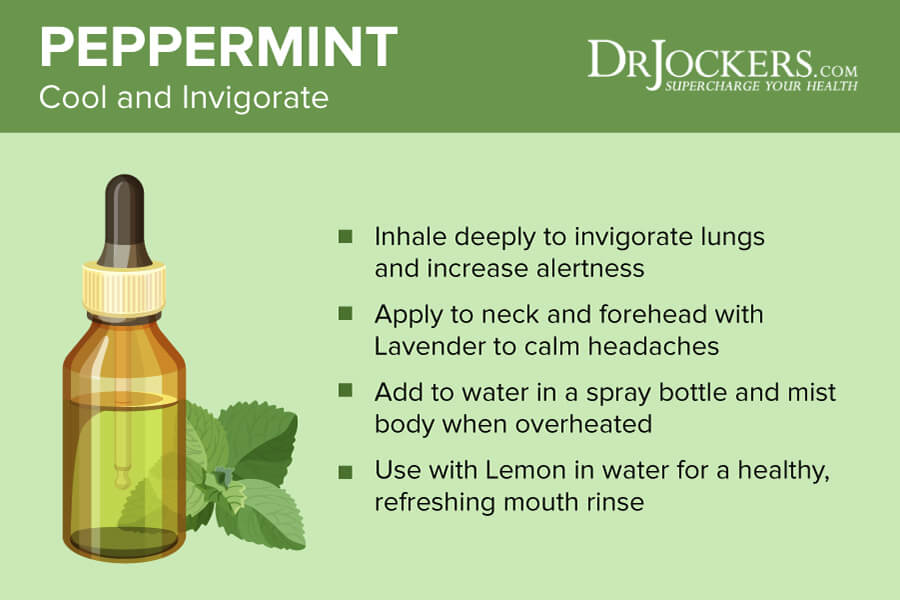
Lung Health Formula
A 2017 study published in the Journal of Evidence-Based, Complementary, and Alternative Medicine found that lemon balm may have antioxidant properties (36). A 2014 study published in Biomedicine Research International has found that citrus peel, including orange peel, may support normal cytokine levels (37). According to a 2000 review published in the Journal of Ethnopharmacology, plantain leaf may offer anti-inflammatory and immuno-modulatory effects (38).
According to a 1996 study published in the Journal of Chromatography A, chaparral leaf may have some antiviral effects (39). According to a 2020 study published in the Journal of Ethnopharmacology, elecampane root may have anti-inflammatory effects for respiratory issues (40).
A 2004 study published in Chemical Information has found that lobelia flower may be beneficial for respiratory and lung issues (41). A 2016 study published in Frontiers in Pharmacology has found that menthol may offer anti-inflammatory benefits (42).
This is a fantastic product for helping to clear upper respiratory infections and reduce swelling and soreness in the throat and sinuses. This product helps clear excess mucus and heal the throat and respiratory pathways. The liquid form is easy to use, and the 1-oz bottle is easy to travel with as well.
I recommend 6 sprays 3 times a day for adults and children over age 12. For children between 6 and 12, I recommend 4 sprays 3 times a day, and between ages 3 and 6, 2 sprays 3 times a day. You may also use this to fight air toxins and allergies.
Final Thoughts
Strep throat is a bacterial infection that causes an infection of the throat and tonsils, sore and red throat with white patches, difficulty swallowing, and other symptoms. I recommend trying the natural support strategies as outlined in this article to improve your health.
If you want to work with a functional health coach, I recommend this article with tips on how to find a great coach. On our website, we offer long-distance functional health coaching programs. For further support with your health goals, just reach out—our fantastic coaches are here to support your journey.
Inflammation Crushing Ebundle
The Inflammation Crushing Ebundle is designed to help you improve your brain, liver, immune system and discover the healing strategies, foods and recipes to burn fat, reduce inflammation and Thrive in Life!
As a doctor of natural medicine, I have spent the past 20 years studying the best healing strategies and worked with hundreds of coaching clients, helping them overcome chronic health conditions and optimize their overall health.
In our Inflammation Crushing Ebundle, I have put together my very best strategies to reduce inflammation and optimize your healing potential. Take a look at what you will get inside these valuable guides below!

